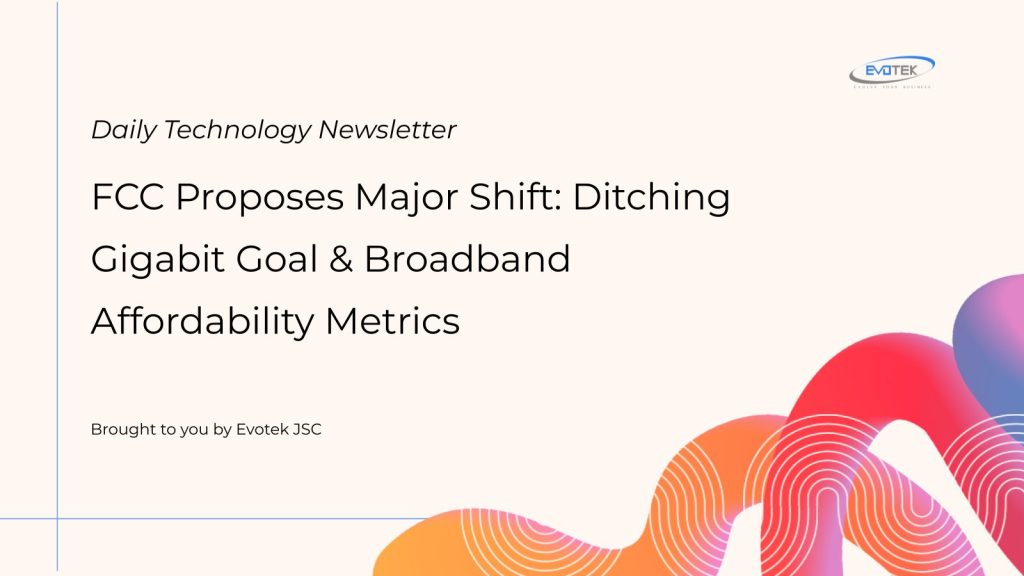The Federal Communications Commission (FCC) is poised to overhaul its approach to measuring nationwide broadband progress, a move that could significantly alter how the agency assesses internet accessibility and performance across the United States. Under a new proposal from FCC Chairman Brendan Carr, the commission would discard several key standards established during the previous administration, including a long-term gigabit speed target and efforts to analyze broadband affordability.
These proposed changes, set for a vote on August 7, are expected to make it easier for the FCC to give the broadband industry a favorable rating in its annual progress report. Chairman Carr’s plan suggests the industry could receive a “passing grade” even without achieving 100 percent universal deployment, signaling a notable departure from previous benchmarks.
Shifting Standards for Broadband Deployment
At the heart of the FCC’s mandate is Section 706 of the Telecommunications Act, which requires the commission to determine if advanced telecommunications capabilities are being deployed “on a reasonable and timely basis” to all Americans. If the deployment is deemed insufficient, the law compels the FCC to “take immediate action to accelerate deployment.”
Historically, the interpretation of Section 706 has often aligned with the political leanings of the FCC’s leadership. Democratic-led commissions have typically concluded that broadband deployment is inadequate and have frequently raised speed benchmarks. Conversely, Republican-led commissions have generally found deployment to be sufficient and have maintained existing speed standards.
Chairman Carr’s proposal specifically aims to realign the Section 706 inquiry with the statute’s “plain language.” He intends to focus on whether broadband “is being deployed” in the present, rather than assessing whether it “already has been deployed.” This reinterpretation, according to Carr, offers a more nuanced understanding of progress than a simple binary assessment of 100% deployment.
Affordability Deemed “Extraneous”
One of the most significant aspects of the new proposal is its decision to cease investigations into broadband affordability. Chairman Carr has labeled such inquiries as “extraneous” to the core statutory mandate of Section 706, arguing that terms like “affordability” and “adoption” are not explicitly mentioned in the statute itself.
The previous administration had sought to integrate a more comprehensive analysis of broadband prices, with former Chairwoman Jessica Rosenworcel emphasizing the need for granular pricing data, especially for rural areas. However, Carr’s proposal argues that expanding the Section 706 inquiry beyond deployment metrics departs from the historical conduct of the commission and is not supported by the statutory text. This stance is further bolstered by a reference to a Supreme Court ruling that limits federal agencies’ ability to interpret ambiguous laws, advocating for strict adherence to statutory text.
Scrapping the Gigabit Speed Goal
The current FCC proposal also seeks to eliminate the long-term broadband speed goal of 1,000 Mbps download and 500 Mbps upload, which was established in March 2024. This ambitious target was set alongside the increase of the minimum broadband speed benchmark to 100 Mbps download and 20 Mbps upload.
Carr’s plan asserts that a long-term speed goal is not explicitly mentioned in Section 706 and risks “skewing the market by unnecessarily potentially picking technological winners and losers.” The proposal suggests that such a high benchmark could disadvantage technologies like satellite and fixed wireless, which currently may not support these speeds, thereby violating the principle of technological neutrality.
While the long-term gigabit goal faces abolition, the 100/20 Mbps fixed broadband standard appears likely to remain the current benchmark for measuring availability, though the proposal does seek public comment on this approach, leaving a potential for future adjustments.
A Regulatory Philosophy of Deletion
Beyond these specific changes, Chairman Carr’s proposal aligns with his broader “Delete, Delete, Delete” initiative, which aims to eliminate regulations deemed unnecessary or burdensome. The proposal invites public comment on existing broadband regulations that might impede deployment, investment, competition, and technological innovation, signaling a move towards deregulation rather than additional oversight.
This comprehensive set of proposed changes highlights a significant shift in the FCC’s regulatory philosophy, moving away from a more expansive interpretation of its role in ensuring universal, affordable, and high-speed broadband access for all Americans.

 日本語
日本語 한국어
한국어 Tiếng Việt
Tiếng Việt 简体中文
简体中文